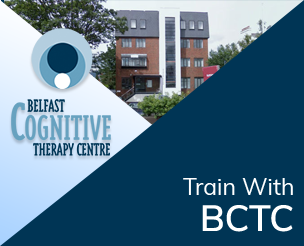 When we come along to Cognitive Behaviour Therapy the words themselves are a bit off putting – what is it? Yet good CBT should be simple. It just means that we learn to change how we think and behave. Today we’ll look at how we might need to change our thinking. One example is that when we panic, we typically get some or all of the 13 symptoms below:
When we come along to Cognitive Behaviour Therapy the words themselves are a bit off putting – what is it? Yet good CBT should be simple. It just means that we learn to change how we think and behave. Today we’ll look at how we might need to change our thinking. One example is that when we panic, we typically get some or all of the 13 symptoms below:
- Palpitations, pounding heart or accelerated heart rate
- Sweating
- Trembling or shaking
- Sensations of shortness of breath or smothering
- Feelings of choking
- Chest pain or discomfort
- Nausea or abdominal distress
- Feeling Dizzy, unsteady, lightheaded or faint
- Chills or Heat sensations
- Numbness or tingling sensations
- Feelings of unreality) or being spaced out
- Fear of losing control or ‘going crazy’
- Fear of dying
These symptoms are normal, and panic is not difficult to reduce. The problem is that instead of understanding the symptoms (so we don’t make the panic and therefore the panic symptoms worse) we panic about them – which does make them worse.
One example of this might be giving a talk. We panic a bit so maybe our hearts beat rapidly, we may get chest pain and some dizziness. Understandably we may think there must be something wrong with us … maybe a heart attack (when, in reality we’re just panicky about giving a talk.) What do you think happens to the panic symptom s if we think we’re having a heart attack?
Yes of course – they increase. Then when they increase, we get even more panicky and the panic symptoms increase again. Before you know it we’re into a full blown panic attack.
So how do we reduce the panic? Well, rather than panic about them we think rationally about them. Example: Instead of ‘Im having a heart attack’ we think ‘Of course I’m having panic symptoms. I’m very nervous about giving this talk – not because I’m having a heart attack’.
When we become less frightened of the panic symptoms what do you think happens to them? Yes, they reduce. (The problem of giving the talk is still a problem, of course, but a different one. We’ll discuss that another day!)
See you in September,
Anne
25th July 2023
- If you want to email me you’re welcome – anne.kelly@belfastctcentre.com
- Please note – some difs may be too complex to write about in a blog but I’ll help where I can.
- Also I’ll need you to agree that I can use parts or all of your difficulty in my blogs – but without disclosing any identifiable details about you.
Anne Kelly is a HCPC registered psychologist and a BABCP accredited CB psychotherapist. She has been practicing as a therapist for 30 years and has taught several hundred cognitive behavioural psychotherapists.


